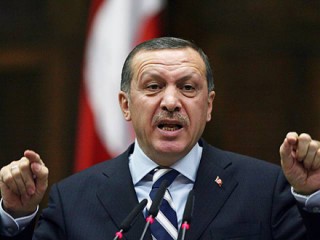
Recep Tayyip Erdogan biography
Date of birth : 1954-02-26
Date of death : -
Birthplace : Rize, Turkey
Nationality : Turkish
Category : Politics
Last modified : 2010-07-20
Credited as : Politician, Prime Minister of Turkey,
10 votes so far
The Justice and Development Party (AK) in Turkey enjoyed victory in Turkey's November 2002 elections, however, Recep Tayyip Erdogan, as leader of the party, was banned under Turkish law from taking the role of prime minister, and from political life altogether. Seen as a religious zealot, whose public recitation of an Islamic poem, Erdogan was convicted in 1998 of inciting religious hatred. A change in the law by March 2003 would erase the prohibition for putting the overwhelmingly popular politician into his country's leadership.
Joined Islamist Movement
Erdogan was born on February 26, 1954, in the city of Rize on Turkey's Black Sea coast. He was one of five children of a father who was with the country's coast guard. When Erdogan was 13, his father moved his family to Istanbul in an attempt to emerge from a life of poverty, hoping that life in the city would offer more opportunities. Erdogan sold lemonade and sesame buns on the street in some of Istanbul's poorest neighborhoods. His education began in an Islamic school, and continued at Istanbul's Marmara University where he received a degree in business management. His interest in politics was sidestepped only by his interest in soccer, playing the sport professionally for several years before continuing into the political arena.
Erdogan joined the Islamist movement while at the university, influenced by Necmettin Erbakan, who eventually became Turkey's first Islamist prime minister. In 1980, while working for Istanbul's transport authority, Erdogan refused to shave off his moustache on the orders of his boss, a retired colonel, and was forced to quit. As an active member of the Welfare Party at the time, Erdogan continued his political adventures as a militant Islamic. In 1998, the party was banned--four years following Erdogan's election as mayor of Istanbul. While he was a popular mayor who improved the city's environment, Erdogan did not win the hearts of those secularists who did not appreciate his ban on alcohol in the cafes and restaurants of the city. Despite his religious views, his reputation as a politician free from corruption brought him admiration from all circles.
Militancy Punished
When the 1998 incident landed Erdogan in jail to serve a ten-month sentence, he automatically put his future in politics in jeopardy--no convicted criminal was permitted to run for elective office. In the winter following the November 2002 election, that changed when parliament passed a law lifting the ban. When he was named Prime Minister in March 2003, the United States took particular interest because Erdogan favored allowing the United States to deploy troops from Turkey above Iraq's northern border as that country prepared for the war to oust Saddam Hussein and his guard from Iraq. But, in the end, the Turkish parliament voted against that deployment.
By the middle of June, Karl Vick reported for the Washington Post that the Bush administration was complaining that "Turkey is not supporting the hardening U.S. line against those governments [Iran and Syria], which the United States has listed as sponsors of terrorism." Another strain led Turkey to push most U.S. forces out of Incirlik, "saying that they are no longer needed to enforce the 'no-fly' zone established over northern Iraq during the first Gulf War in 1991," reported Vick.
Attempted to Work With Military
Erdogan himself, in a show of putting his Islamist militarism in his past, attempted to work with his nation's military in enforcing the constitution that separates church and state. The military continued in their concern that Erdogan and the inexperienced government would continue to make mistakes in that regard while running the country intent on admittance to the European Union. Other challenges that Erdogan faced early in his tenure were allegations by Greece that Turkish planes were harassing civilian planes over the Aegean--and attempts to continue the long struggle between the two nations over the rule of the island of Cyprus, a territory to which both nations have staked a claim in the past.
Erdogan is married and has four children.
October 9, 2003: Erdogan brushed aside objections to Turkey's decision to send thousands of soldiers to Iraq for the first time since Turkish troops were driven out in 1917.
January 7, 2006: Erdogan called on residents of Turkey to cooperate with a cull of domestic poultry, after three Turkish children died of the H5N1 strain of bird flu.
April 14, 2007: Over 300,000 people marched in Ankara, Turkey, to protest the possibility that Erdogan might be chosen as the AK Party's presidential candidate for upcoming elections. The protesters objected to Erdogan's Islamist background and called for Turkey's government to remain secular.
July 22, 2007: Erdogan won another term as prime minister of Turkey.
March 31, 2008: The Turkish Constitutional Court agreed to consider a petition that claimed that Erdogan's AK Party had illegally attempted to increase the role of Islam in public life. If the court agrees with the petition, Erdogan could be barred from holding office for five years.
May 27, 2008: Erdogan announced that Turkey would spend $14.5 billion over five years to promote economic development in the Kurdish regions of southeastern Turkey.
July 30, 2008: The Turkish Constitutional Court narrowly voted not to ban Erdogan's AK Party.
















